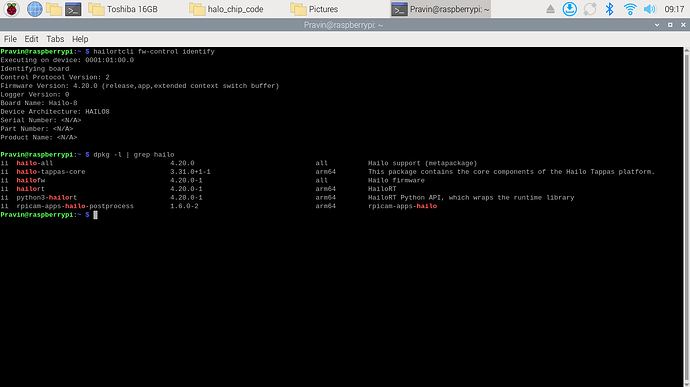Hi Hailo Team,
I’m trying to run two YOLO-based HEF models at the same time on my Raspberry Pi 5 using the Hailo-8 AI Hat (M.2 interface).
Setup Info:
-
Raspberry Pi 5 + Hailo-8
-
Python 3.11 (with virtual env)
-
Hailo packages installed:
hailo-all,hailort,python3-hailort,hailofw,hailo-tappas-core
-
HEF models:
model1.hefandmodel2.hef, created using the Hailo Model Zoo (ONNX to HEF) -
Both models run individually using
hailo-rpi5-examplesrepo
What I’m trying to do:
I want to run both models in parallel, either using multiprocessing or threading.
Code Attempts:
- Multiprocessing approach
Based on Hailo’s official tutorial:
“hailort/hailort/libhailort/bindings/python/platform/hailo_tutorials/notebooks/HRT_3_Infer_Pipeline_Inference_Multiple_Models_Tutorial.ipynb at master · hailo-ai/hailort · GitHub”
“”
code:
import numpy as np
from multiprocessing import Process
from hailo_platform import (HEF, VDevice, HailoStreamInterface, InferVStreams, ConfigureParams,
InputVStreamParams, OutputVStreamParams, InputVStreams, OutputVStreams, FormatType, HailoSchedulingAlgorithm)
# Define the function to run inference on the model
def infer(network_group, input_vstreams_params, output_vstreams_params, input_data):
rep_count = 100
with InferVStreams(network_group, input_vstreams_params, output_vstreams_params) as infer_pipeline:
for i in range(rep_count):
infer_results = infer_pipeline.infer(input_data)
def create_vdevice_and_infer(hef_path):
# Creating the VDevice target with scheduler enabled
params = VDevice.create_params()
params.scheduling_algorithm = HailoSchedulingAlgorithm.ROUND_ROBIN
params.multi_process_service = True
params.group_id = "SHARED"
with VDevice(params) as target:
configure_params = ConfigureParams.create_from_hef(hef=hef, interface=HailoStreamInterface.PCIe)
model_name = hef.get_network_group_names()[0]
batch_size = 2
configure_params[model_name].batch_size = batch_size
network_groups = target.configure(hef, configure_params)
network_group = network_groups[0]
# Create input and output virtual streams params
input_vstreams_params = InputVStreamParams.make(network_group, format_type=FormatType.FLOAT32)
output_vstreams_params = OutputVStreamParams.make(network_group, format_type=FormatType.UINT8)
# Define dataset params
input_vstream_info = hef.get_input_vstream_infos()[0]
print(input_vstream_info.shape)
image_height, image_width, channels = input_vstream_info.shape
num_of_frames = 10
low, high = 2, 20
# Generate random dataset
dataset = np.random.randint(low, high, (num_of_frames, image_height, image_width, channels)).astype(np.float32)
input_data = {input_vstream_info.name: dataset}
infer(network_group, input_vstreams_params, output_vstreams_params, input_data)
# Loading compiled HEFs:
first_hef_path = '/home/Pravin/halo_chip_code/hefs/model1.hef'
second_hef_path = '/home/Pravin/halo_chip_code/hefs/model2.hef'
first_hef = HEF(first_hef_path)
second_hef = HEF(second_hef_path)
hefs = [first_hef, second_hef]
infer_processes = []
# Configure network groups
for hef in hefs:
# Create infer process
infer_process = Process(target=create_vdevice_and_infer, args=(hef,))
infer_processes.append(infer_process)
print(f'Starting inference on multiple models using scheduler')
infer_failed = False
for infer_process in infer_processes:
infer_process.start()
for infer_process in infer_processes:
infer_process.join()
if infer_process.exitcode:
infer_failed = True
if infer_failed:
raise Exception("infer process failed")
print('Done inference')
“”
error:
cb.py
Starting inference on multiple models using scheduler
(640, 640, 3)
(640, 640, 3)
[HailoRT] [error] CHECK_SUCCESS failed with status=HAILO_INVALID_ARGUMENT(2)
[HailoRT] [error] CHECK_SUCCESS failed with status=HAILO_INVALID_ARGUMENT(2)
[HailoRT] [error] CHECK_SUCCESS failed with status=HAILO_INVALID_ARGUMENT(2)
[HailoRT] [error] CHECK_SUCCESS failed with status=HAILO_INVALID_ARGUMENT(2)
[HailoRT] [error] CHECK_SUCCESS failed with status=HAILO_INVALID_ARGUMENT(2)
[HailoRT] [error] CHECK_SUCCESS failed with status=HAILO_INVALID_ARGUMENT(2)
Process Process-1:
Traceback (most recent call last):
File “/usr/lib/python3.11/multiprocessing/process.py”, line 314, in _bootstrap
self.run()
File “/usr/lib/python3.11/multiprocessing/process.py”, line 108, in run
self._target(*self._args, **self._kwargs)
File “/home/Pravin/halo_chip_code/cb.py”, line 45, in create_vdevice_and_infer
infer(network_group, input_vstreams_params, output_vstreams_params, input_data)
File “/home/Pravin/halo_chip_code/cb.py”, line 10, in infer
with InferVStreams(network_group, input_vstreams_params, output_vstreams_params) as infer_pipeline:
File “/usr/lib/python3/dist-packages/hailo_platform/pyhailort/pyhailort.py”, line 930, in enter
self._infer_pipeline = _pyhailort.InferVStreams(self._configured_net_group._configured_network,
^^^^^^^^^^^^^^^^^^^^^^^^^^^^^^^^^^^^^^^^^^^^^^^^^^^^^^^^^^^^^^^^^^^^^^^^
hailo_platform.pyhailort._pyhailort.HailoRTStatusException: 2
Process Process-2:
Traceback (most recent call last):
File “/usr/lib/python3.11/multiprocessing/process.py”, line 314, in _bootstrap
self.run()
File “/usr/lib/python3.11/multiprocessing/process.py”, line 108, in run
self._target(*self._args, **self._kwargs)
File “/home/Pravin/halo_chip_code/cb.py”, line 45, in create_vdevice_and_infer
infer(network_group, input_vstreams_params, output_vstreams_params, input_data)
File “/home/Pravin/halo_chip_code/cb.py”, line 10, in infer
with InferVStreams(network_group, input_vstreams_params, output_vstreams_params) as infer_pipeline:
File “/usr/lib/python3/dist-packages/hailo_platform/pyhailort/pyhailort.py”, line 930, in enter
self._infer_pipeline = _pyhailort.InferVStreams(self._configured_net_group._configured_network,
^^^^^^^^^^^^^^^^^^^^^^^^^^^^^^^^^^^^^^^^^^^^^^^^^^^^^^^^^^^^^^^^^^^^^^^^
hailo_platform.pyhailort._pyhailort.HailoRTStatusException: 2
Traceback (most recent call last):
File “/home/Pravin/halo_chip_code/cb.py”, line 72, in
raise Exception(“infer process failed”)
Exception: infer process failed
- My own multithreaded version
I used VDevice() and tried to call create_network_group(), but it gave:
code:
import cv2
import time
import threading
import numpy as np
from hailo_platform import HEF, VDevice, HailoSchedulingAlgorithm, FormatType
# Configuration
models = [
("model1", "/home/Pravin/halo_chip_code/hefs/model1.hef", (640, 640)),
("model2", "/home/Pravin/halo_chip_code/hefs/model2.hef", (640, 640))
]
shared_frames = [None] * len(models)
frame_lock = threading.Lock()
frame_ready = threading.Event()
stop_flag = threading.Event()
def preprocess(frame, input_shape):
frame_resized = cv2.resize(frame, input_shape)
frame_transposed = frame_resized.transpose(2, 0, 1) # HWC to CHW
input_data = frame_transposed[np.newaxis, ...].astype(np.uint8)
return input_data
def run_model_thread(model_index, model_id, hef_path, input_shape, vdevice):
try:
print(f"[{model_id}] Initializing...")
hef = HEF(hef_path)
network_group = vdevice.create_network_group(hef)
input_name = network_group.get_input_stream_infos()[0].name
output_name = network_group.get_output_stream_infos()[0].name
input_vstream = network_group.get_input_vstream(input_name, format_type=FormatType.UINT8)
output_vstream = network_group.get_output_vstream(output_name)
print(f"[{model_id}] Ready for inference.")
while not stop_flag.is_set():
frame_ready.wait()
with frame_lock:
frame = shared_frames[model_index]
if frame is None:
continue
input_data = frame.copy()
frame_ready.clear()
input_vstream.write(input_data)
output_data = output_vstream.read()
print(f"[{model_id}] Output shape: {output_data.shape}, max value: {np.max(output_data)}")
except Exception as e:
print(f"[{model_id}] Error: {e}")
def video_capture_loop(model_shapes):
cap = cv2.VideoCapture(0)
if not cap.isOpened():
print("❌ Could not open video source")
return
try:
while not stop_flag.is_set():
ret, frame = cap.read()
if not ret:
break
with frame_lock:
for i, shape in enumerate(model_shapes):
shared_frames[i] = preprocess(frame, shape)
frame_ready.set()
cv2.imshow("Live Feed", frame)
if cv2.waitKey(1) & 0xFF == ord('q'):
stop_flag.set()
break
finally:
cap.release()
cv2.destroyAllWindows()
stop_flag.set()
frame_ready.set()
# Initialize shared virtual device
#vdevice = VDevice(device_count=1, scheduling_algorithm=HailoSchedulingAlgorithm.ROUND_ROBIN)
vdevice = VDevice()
# Launch model threads
threads = []
for i, (model_id, hef_path, input_shape) in enumerate(models):
t = threading.Thread(target=run_model_thread, args=(i, model_id, hef_path, input_shape, vdevice))
t.start()
threads.append(t)
# Start video input loop
video_capture_loop([shape for _, _, shape in models])
# Wait for threads to finish
for t in threads:
t.join()
print("✅ All threads complete. Inference stopped.")
error:
"
[model1] Initializing…
[model2] Initializing…
[model1] Error: ‘VDevice’ object has no attribute ‘create_network_group’
[model2] Error: ‘VDevice’ object has no attribute ‘create_network_group’
[ WARN:0@0.685] global ./modules/videoio/src/cap_gstreamer.cpp (2401) handleMessage OpenCV | GStreamer warning: Embedded video playback halted; module v4l2src0 reported: Failed to allocate required memory.
[ WARN:0@0.686] global ./modules/videoio/src/cap_gstreamer.cpp (1356) open OpenCV | GStreamer warning: unable to start pipeline
[ WARN:0@0.686] global ./modules/videoio/src/cap_gstreamer.cpp (862) isPipelinePlaying OpenCV | GStreamer warning: GStreamer: pipeline have not been created
![]() All threads complete. Inference stopped.
All threads complete. Inference stopped.
"
Screenshots:
- Hailo device and driver info (attached)
- HEF model folder (
model1.hef,model2.hef)
What I need help with:
- How can I correctly run two models in parallel on a single Hailo-8 with RPi5?
- Is
VDevicethe correct way for multi-model parallel execution? - Why is
create_network_group()not working onVDevice()? - Any working code example or official guidance for this setup?
Thanks for your support!
Pravin kumar R
additional screenshots:

